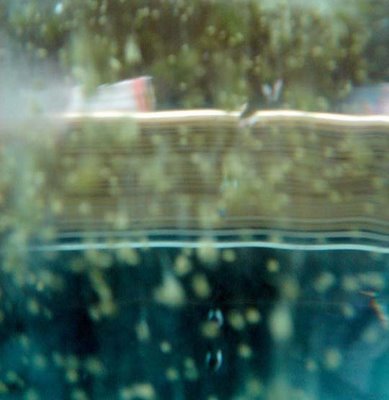 ...nothing's
...nothing's
to save us save loss itself.-- A.R. Ammons, “Regards Regardless”
Here at spring tide's sinewed cusp, it's strange to feel so lost, so emptied of purpose and poems, so riven by work in a soured uncivil world, my wife depressed too, slowing at tasks, either insomniac or drugged through the night, hot flashes surging through her like volts of malaise.
These days my loins are itchy, fevered for impossible liaisons, angry at the dearth of mewling coitions. Here at stagnation, booze glows in its shot glass like a profanely bright invitation to darkness. The body, collapsing in its years, no longer tight, fit only in tandems (this calf, that bicep) nothing to marvel at any more or even much notice amid the masculine blooms apexing in the quarters of blind youth. Only a savage humility remains, breaky and achey, all dick and heartfelt soul-deep amends for what libido never redeems.
I was at such a low hour at the gym yesterday, threshing this flesh which no longer matters and not much responds to pent iron rituals I've been about for two decades. I was worried about my wife in her gloom as I watched a girl on the treadmill in front of me work her exquisite curves to a sheen, like sweat on a vodka bottle fresh from deep freeze beading in the morning sun.
It came to me then how essential the Prayer of Saint Francis is to it all with its message to comfort rather than be comforted, to give back exactly where there's so little hope of receiving, else I drown my world in the fathoms of its dissembling age in mine.
How important it is to make gratitude a verb and start wielding it like a hoe in the tough fields of work and home and even here. Of course it never mattered, that's surely the point: the throat praises when all is extinguished, recalling in gorgeous sounds how Eurydice looked on her wedding day, just before she stepped on her fate, so full of the spring which fled with a gasp, soft, imperially lush like a wheatfield or orange grove in bloom, the breeze quintessentially in surf with her name -- a breath which was freed forever from me when I first saw my wife standing across a crowded bar, perfect in a white paintsuit, her auburn hair like brown fire, eyeing me once and then turning to the bar to order a glass of wine, that shape of turning a door opening into my life, down into my heart and at last impossibly achingly sweet. I prayed for her as I finished my round on that workout machine, prayed for her next door to open wide with a welcome; prayed for our cats and for my sponsees and my aging parents; prayed for every love I had lost or squandered; prayed for our world to live through its waste and come to love the whole world in its thrall:
Then toweled off and headed over to the weights to lift it all back in place.
CLEARING A FIELD1996
What has been spoiled through a man's fault
Can be made good again through a man's work.-- I Ching
I walked out beyond the margins of this day,
out beyond the dying metaphors of the age,
beyond the lost rapture and broken communion,
beyond the cankered oaks and river sewage,
beyond the clearcut orchards' blossom of rot,
beyond the phosphate mines and beach condos,
beyond the landfills and ravaged wetlands,
I walked beyond the sere rim of this world
into another, green and strange and wild.
Further on I went, tracking into new territory,
Heading through the skirts of suburbs,
past the roadside sellers of peanuts and Elvis,
past 7-11's and junkyards and titty bars,
past burger joints and strip malls and mega cinemas,
down crumbling asphalt avenues of towering banks
casting long shadows of greed and fear:
Finding no hope there I continued on,
walking past the numbing grind of preterition,
stepping lightly round the cynic's sucking bog,
climbing over the fretful ridge of scarcer times
and out beyond this century's heart into what's truly wild,
finding beyond all streets a dark arousal,
beyond all wasted ends a wondrous door,
beyond the exiled flesh a shimmering bath deep in the body,
finding beyond exhaustion a field ripe with possibility.
There beyond what's known too terribly well
I found a paradise -- a dark, dreamy, fertile hell.
I exceed all boundary because the world is not geography.
I resist all seductions for one acre of your smile.
I harvest heart and heather for an exquisite hour on the page,
hacking and burning and turning a soil of words,
watering with the thunder and coo of lyric storms,
praising what is made well, whether by God or by hand,
whether saline or sulfrous, be it living or dead,
whether jissomed or breasted or sprouted or lathed,
celebrating this shaking bed of past and future,
tearing down the barbed wire between word and world,
bathing in the similitude of sea wash and tears,
singing of the wished for and the cursed,
ushering in the fallen and the prime,
sweating over the necessary and luxuriant,
praising flower and tower for their succulent tropes:
I worship this raw world born from dead words,
turning the loam with this humble poem,
watering the furrows with my broken joy,
heaping shit on shame for their ripening wrong,
walking back and forth between firmaments,
the son of two makings, clearing a field
for one summer breeze and one small song.
SONNETS TO ORPHEUS I.viiRainier Maria Rilke
transl. Stephen Mitchell
Praising is what matters! He was summoned for that,
and came to us like the ore from a stone's
silence. His mortal heart presses out
a deathless, inexhaustible wine.
Whenever he feels the god's paradigm grip
his throat, the voice does not die in his mouth.
All becomes vineyard, all becomes grape,
ripened on the hills of his sensuous South.
Neither decay in the sepulcher of kings
nor any shadow fallen from the gods
can ever detract from his glorious praising.
For he is a herald who is with us always,
holding far into the doors of the dead
a bowl with ripe fruit worthy of praise.
BEGIN HEREMarch 1996
Begin here
where there
is no poetry,
only the clutter
of late winter,
the manic
mind's exile
in motion,
whirligagging
with the cold
moon for the
sake of something
to whirl.
Begin here
where there is
no beginning,
only these
shattered pixels
of sour winter light
swaddling the
frozen rubble of
last year's rot.
Here where
nothing and less
contend for
winter's
miserable crown
poetry sparks a fuse,
urging the day
down a simple
and singular path,
winding through
the ghetto
of bleak afternoons
to a quiet field
where berries
may yet sprout
like fire in the
heart of the city
o yes
this poor master
of silence and silk
asks only
that you
begin here:
***
BEACH GRACEApril 2003
A good day. A few sentences.
One that almost has the feel of the true.-Flaubert
My reward for Being, was This.- Emily Dickenson
When I get lost in the day's
infinite lack of gain,
I stop at a moment's pauses
and walk onto a beach
that's always there and
sit a while, a nothing about
nothing & asking less,
cupping what I can in these
hands and carrying it back
to a dry, desperate world
hurrying through so much
paradise. My hands only
hold so much: I spilled
some on my knees giving thanks,
some more on this page
(here and less there); the
rest I'll take upstairs to
my wife to rub salt traces
onto her feet, light and
gentle as the sea's blue sashay
under this waking, perfect day.
***
LABOR DAY BY THE SEA2000
Into the amniotic wash of Labor Day by the sea,
Ponce Inlet, SUVs and vans perched feet from high tide,
a sweet dreamy breeze caressing waves softly toward the shore,
sun straight up the dome and still fierce,
my body yielding to the kiss and suck of summer and sea
and curved eternities:
I sit in my folding chaise reading Walt Whitman to the salt breeze,
singing lines which pulsed rhythmic between my body and the sea,
trailing off the page to watch passerby, kids with boogie boards,
young couples proud in what still is unripened,
mothers given over to the suck of their babies,
leathery old men and women resolute to their end,
all emptying out like a tide, leaving just the sea before me,
softly folding and breaking in warm plashing waves,
sibilant in all the ejaculate praises of Walt, the song never ending,
finding in each new age new hearts to break into what now
passes for praise, nursing my aches and spawning my fevers:
I thought I heard the sea sigh oh come nestle in me
as it broke gently into foam and so I walked out into the surf
not believing a syllable but wishing it ever more,
praying for baptism to the rhythm and pulse of each wave,
finally diving beneath a tall one and going still trying to feel
God's dazzle and drowse wash over and through me
cleansing and lifting me up from selfish gambols,
but it was just a wave going over and I rose up into brilliant clean air
no fresher with rebirth than a moment before but such truths
themselves are nourishing, forever alone yet one inside the womb
I wake and walk from merged at least between arrow and bow
riding metaphorically a dolphin which takes me beyond all I know:
The sun and sea are just ciphers, a mystery which refuses solution
though I stand here naked as law and love permit, my pilgrimage unending:
“You must derange your life” I wrote by these waters five years ago,
but now I think there isn't really a choice, life makes you crazy anyway;
Today I hear the sea sing to me
love well your wounds for in thy blooding thou art free;
salt smart hugs I have for you on this bed which rises and fallsAnd I close my eyes standing in the shallows of the rest of this life
hoping to praise what little I have, praying to love with all of my heart, turning back toward shore at last without any benediction to share
with you but blue green waters and a brilliant sun
and a breeze which sighs
Eurydice O woman of waters
I am forever here on this shore between I and Thou
singing ocean songs to the sea, braiding your name in the day.
***
SONNETS TO ORPHEUS 2.29Ranier Maria Rilke
transl. Stephen Mitchell
Silent friend of many distances, feel
how your breath enlarges all of space.
Let your presence ring out like a bell
into the night. What feeds upon your face
grows mighty from the nourishment thus offered.
Move through transformation, out and in.
What is the deepest loss you have suffered?
If drinking is bitter, change yourself to wine.
In this immeasurable darkness, be the power
that rounds your sense in their magic ring,
the sense of their mysterious encounter.
And if the earthly no longer knows your name,
whisper to the silent earth: I'm flowing.
To the flashing water say: I am.
REGARDS REGARDLESSA.R. Ammons
(
Brink Road, 1996)
We had something to do for a moment
with the eternity of things, we made
contact, the sweeps deeper than we
knew, moving in and out without regard,
we, bits, too little too brief to take
the awful informings in: age edges
us aside: we vacate offices (such as
listening for the cloud, dull oriole
in May) to others whose earth earth's
becoming: but, aside, we note clearly,
having them separate again, bit from
power, second from time's springs:
look, there goes eternity, still astir:
here are roses seen before: nothing's
to save us at last save loss itself:
even our gatherings, bits and pieces,
will with our central dissolving float
free, disordered, unaligned, the chairs
empty, our voices in none of the rooms:
well, it was enough, even if nothing
came of it, no, it was something even
if it becomes nothing, the show turned
full round: freedom freely
enough allowed burns free, burns us free.
***
THE PRAYER OF ST. FRANCISLord, make me an instrument of Your peace.
Where there is hatred, let me sow love;
where there is injury, pardon;
where there is doubt, faith;
where there is despair, hope;
where there is darkness, light;
and where there is sadness, joy.
O, Divine Master,
grant that I may not so much seek
to be consoled as to console;
to be understood as to understand;
to be loved as to love;
for it is in giving that we receive;
it is in pardoning that we are pardoned;
and it is in dying that we are born to eternal life.












